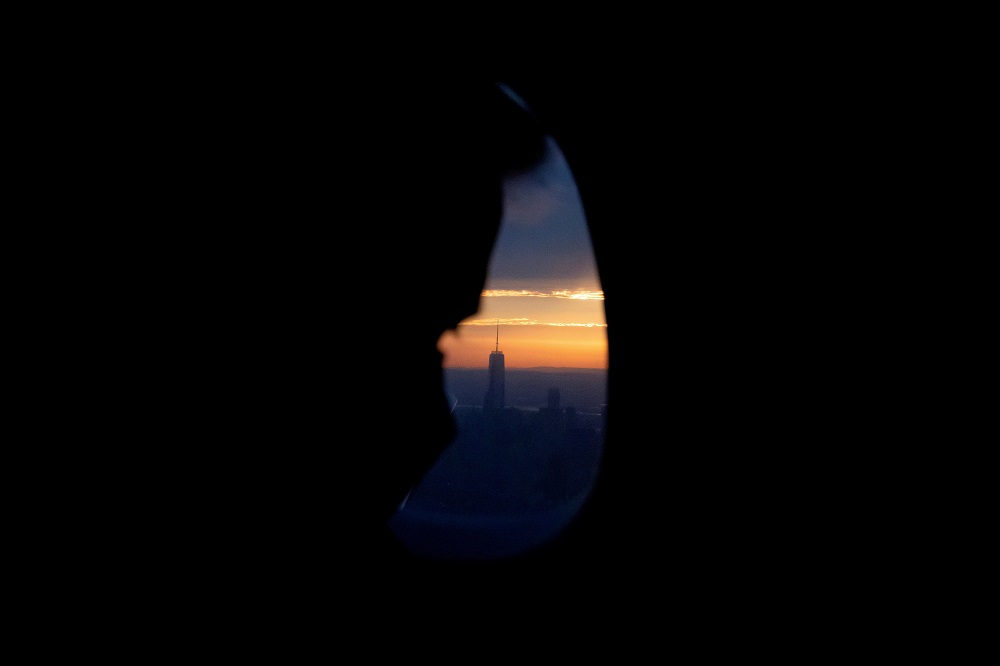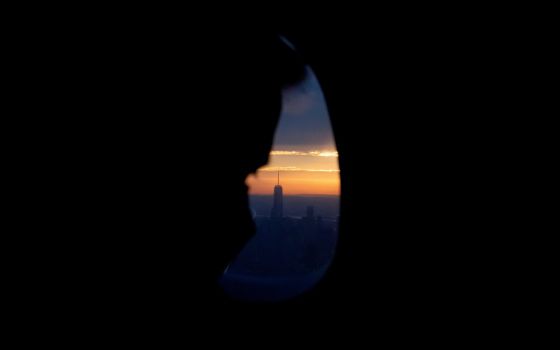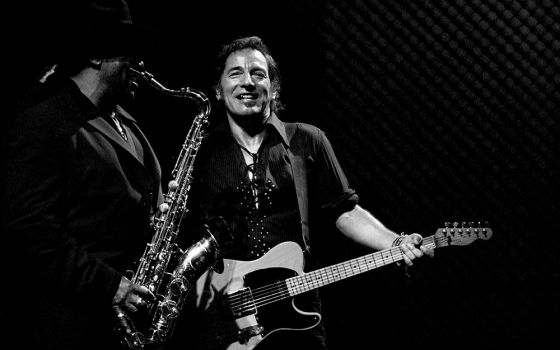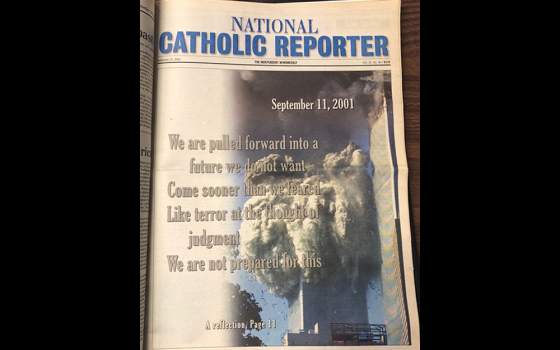
A man on an airplane looks at the One World Trade Center in New York City Sept. 9, 2021. (Carlos Barria, Reuters/CNS)
The 20th anniversary of the terrorist attacks on September 11, 2001, was a beautiful September day, as it was 20 years ago. The past week has been filled with people recalling their experiences of that day, the trauma and the fear. There have been articles analyzing also how our nation responded, in good ways and bad.
So, it was especially poignant and fitting that the president of the United States, Joe Biden, chose to visit all three sites where innocent people were murdered and to say nothing at any of them. The images and the symbols did the talking. Enough had been said and, truth be told, there are no words for such horror.
In New York City, scene of the worst horror that day, the president was joined by former President Bill Clinton, former New York Sen. Hillary Rodham Clinton, former President Barack Obama and his wife, Michelle Obama. Former New York Mayor Rudy Guiliani, who was mayor that day, also attended. Today was not a day to remember more recent scars.
The youth choir of New York sang the national anthem while a flag that flew at the site was carried into the memorial where the towers once stood. Bagpipes accompanied the flag as it was carried out of the venue. There were some other musical performances, including one from Bruce Springsteen. The names of those killed were read. The ceremony was sad and somber as it needed to be and, in a country not given to understatement, it was appropriately understated.
The president then flew to Shanksville, Pennsylvania, where Flight 93 crashed when the passengers, alerted to what had happened that morning in New York and Washington, stormed the cockpit, causing the plane to crash in a field, rather than into the U.S. Capitol building. The president and first lady laid a wreath at the memorial to the victim-heroes.
The president then came to the Pentagon and laid a wreath there. A soldier played taps. It had been a long day. In some ways, it had been a long 20 years. Then it was over and the president headed back to work, the work of democracy. If the terrorists on 9/11 thought they could wreck our democracy, they were wrong.
President Biden did release a video with remarks about the commemoration. He was empathetic and recalled the sense of national unity that day inspired. How different it was from what Grant Gallicho, of the Archdiocese of Chicago, called in a Twitter thread, "the moment we Americans find ourselves in today, when disunity seems to be rising as a perverse form of cultural currency."
Advertisement
Earlier in the day, President George W. Bush delivered a rare speech in Shanksville. Vice President Kamala Harris was on hand, a needed show of national unity. The speech matched the moment. The most important section was this:
As a nation, our adjustments have been profound. Many Americans struggled to understand why an enemy would hate us with such zeal. The security measures incorporated into our lives are both sources of comfort and reminders of our vulnerability. And we have seen growing evidence that the dangers to our country can come not only across borders, but from violence that gathers within. There is little cultural overlap between violent extremists abroad and violent extremists at home. But in their disdain for pluralism, in their disregard for human life, in their determination to defile national symbols, they are children of the same foul spirit. And it is our continuing duty to confront them.
It was not exactly courageous for Bush to link the terrorists of 9/11 with the terrorists of Jan. 6, the imams with the Proud Boys. Even if the linkage was not as explicit as I would have liked, however, in a country that has seen elections won and lost by such close margins, Bush's willingness to call out those who sought to overturn the results of the last election was welcome. It did not earn Bush a pass on the many ways he botched the national response to 9/11, but it did serve to remind us that Bush was wrong but not indecent, and that the difference is important. His call for national unity on the 20th anniversary was a stark contrast to the contemporary divisive rhetoric of the party he once led.
That party belongs not to the Bush clan any longer but to former President Donald Trump and his acolytes. He did not attend any of the official commemorations and he finished his day calling a boxing match in Florida. His absence from the national stage was a small blessing.
This morning, there are no politicians at the site in lower Manhattan where the twin towers once stood. The memorial erected at the site consists of holes in the earth along the perimeter where the walls once stood, with water cascading down into a yet deeper hole. In short, there is an absence instead of a monument. Evil, St. Augustine taught, is an absence, the absence of the good. The memorial could not be more appropriate to the memory of what happened there 20 years ago.







